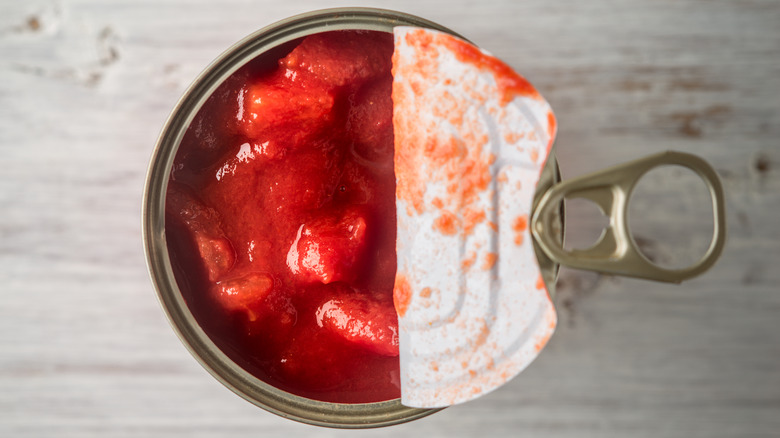The Science Behind How Canned Diced Tomatoes Keep Their Shape For So Long
Canned tomatoes are culinary saviors. Efficiently and quickly crafting Bolognese sauces, tomato soups, and coconut curries, where would cooking be without them? Plus, according to the USDA, canned vegetables and fruits remain safe to consume for years on end, making them an unbeatable pantry addition. But have you ever wondered how diced tomatoes keep their shape? Perhaps it's due to the canning process?
Canning is a method of food preservation that, as Clemson University puts its, "destroys microorganisms that could be a health hazard," and so, it prevents the food from spoiling. Perhaps you assumed that this is what kept your diced tomatoes so firm inside their cans, but whole tomatoes also experience this same processing and do not keep their shape. It is not due to the canning, but instead, due to the addition of a chemical compound. Known as calcium chloride, this compound is the reason some of the best tomatoey recipes can be whipped up in a flash without losing texture.
The science behind chunky canned tomatoes
Calcium chloride is a firming agent that keeps your canned diced tomatoes in good shape, preventing them from softening up or taking on a mushy texture; they remain, instead, wonderfully solid, even when cooked for short periods of time. This makes them ideal for those looking to craft a thicker sauce or those who want to add a chunky body to a chili con carne.
Naturally occurring and also synthetically made, calcium chloride is a solid white salt that has a multitude of uses. Also known by its formula CaCl2, it is a compound formed from calcium and chlorine. Whilst being used as a firming agent in canned food, it is also used as a deicer, dust-deterrent, and road-stabilizer. The diverse applications of calcium chloride are somewhat surprising, given its culinary potential, yet this can also evoke a sense of unease regarding possible health impacts.
To additive or not?
While canned diced tomatoes are certainly safe to consume, learning that calcium chloride is used in non-culinary applications may lead one to question the health implications of this additive. The most notable nutritional aspect of calcium chloride is its extremely high levels of calcium. Calcium plays an important role within the body, as noted by the National Institutes of Health; it strengthens our bones and is integral in the functionality of one's nervous system.
There's also a nutritional advantage to buying canned tomatoes over fresh ones. While this may seem like a great reason to pick up a can of diced tomatoes, whole canned tomatoes are arguably superior to diced. Canned diced tomatoes are best suited for dishes where you don't want to lose texture (like salsa), but whole canned tomatoes will break down fully for a smoother sauce-like consistency (perfect for stews or soups). Now that you know the science behind canned diced tomatoes, you can start searching out where else calcium chloride might be lending a helping, firming hand.


